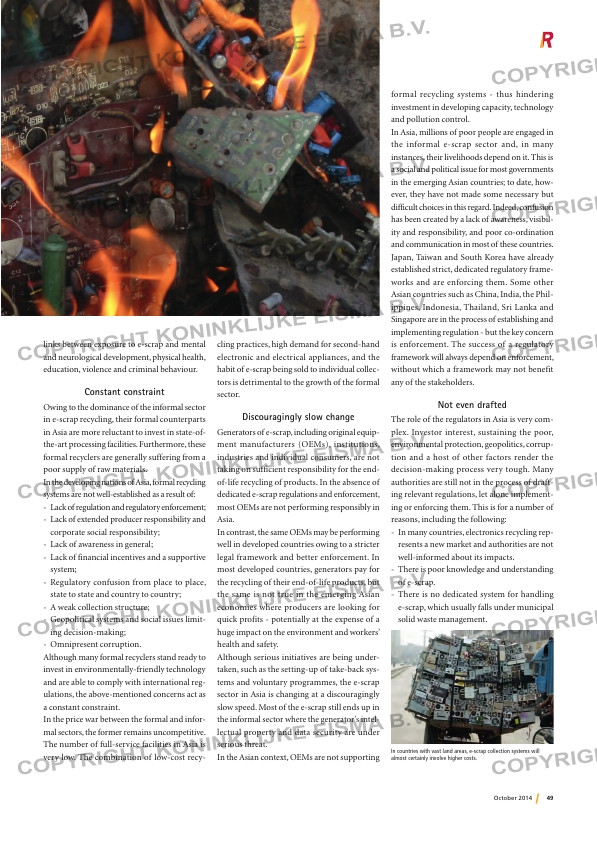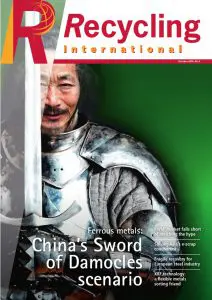Page 49 from: October 2014

49October 2014
links between exposure to e-scrap and mental
and neurological development, physical health,
education, violence and criminal behaviour.
Constant constraint
Owing to the dominance of the informal sector
in e-scrap recycling, their formal counterparts
in Asia are more reluctant to invest in state-of-
the-art processing facilities. Furthermore, these
formal recyclers are generally suffering from a
poor supply of raw materials.
In the developing nations of Asia, formal recycling
systems are not well-established as a result of:
– Lack of regulation and regulatory enforcement;
– Lack of extended producer responsibility and
corporate social responsibility;
– Lack of awareness in general;
– Lack of financial incentives and a supportive
system;
– Regulatory confusion from place to place,
state to state and country to country;
– A weak collection structure;
– Geopolitical systems and social issues limit-
ing decision-making;
– Omnipresent corruption.
Although many formal recyclers stand ready to
invest in environmentally-friendly technology
and are able to comply with international reg-
ulations, the above-mentioned concerns act as
a constant constraint.
In the price war between the formal and infor-
mal sectors, the former remains uncompetitive.
The number of full-service facilities in Asia is
very low. The combination of low-cost recy-
cling practices, high demand for second-hand
electronic and electrical appliances, and the
habit of e-scrap being sold to individual collec-
tors is detrimental to the growth of the formal
sector.
Discouragingly slow change
Generators of e-scrap, including original equip-
ment manufacturers (OEMs), institutions,
industries and individual consumers, are not
taking on sufficient responsibility for the end-
of-life recycling of products. In the absence of
dedicated e-scrap regulations and enforcement,
most OEMs are not performing responsibly in
Asia.
In contrast, the same OEMs may be performing
well in developed countries owing to a stricter
legal framework and better enforcement. In
most developed countries, generators pay for
the recycling of their end-of-life products, but
the same is not true in the emerging Asian
economies where producers are looking for
quick profits – potentially at the expense of a
huge impact on the environment and workers’
health and safety.
Although serious initiatives are being under-
taken, such as the setting-up of take-back sys-
tems and voluntary programmes, the e-scrap
sector in Asia is changing at a discouragingly
slow speed. Most of the e-scrap still ends up in
the informal sector where the generator’s intel-
lectual property and data security are under
serious threat.
In the Asian context, OEMs are not supporting
formal recycling systems – thus hindering
investment in developing capacity, technology
and pollution control.
In Asia, millions of poor people are engaged in
the informal e-scrap sector and, in many
instances, their livelihoods depend on it. This is
a social and political issue for most governments
in the emerging Asian countries; to date, how-
ever, they have not made some necessary but
difficult choices in this regard. Indeed, confusion
has been created by a lack of awareness, visibil-
ity and responsibility, and poor co-ordination
and communication in most of these countries.
Japan, Taiwan and South Korea have already
established strict, dedicated regulatory frame-
works and are enforcing them. Some other
Asian countries such as China, India, the Phil-
ippines, Indonesia, Thailand, Sri Lanka and
Singapore are in the process of establishing and
implementing regulation – but the key concern
is enforcement. The success of a regulatory
framework will always depend on enforcement,
without which a framework may not benefit
any of the stakeholders.
Not even drafted
The role of the regulators in Asia is very com-
plex. Investor interest, sustaining the poor,
environmental protection, geopolitics, corrup-
tion and a host of other factors render the
decision-making process very tough. Many
authorities are still not in the process of draft-
ing relevant regulations, let alone implement-
ing or enforcing them. This is for a number of
reasons, including the following:
– In many countries, electronics recycling rep-
resents a new market and authorities are not
well-informed about its impacts.
– There is poor knowledge and understanding
of e-scrap.
– There is no dedicated system for handling
e-scrap, which usually falls under municipal
solid waste management.
In countries with vast land areas, e-scrap collection systems will
almost certainly involve higher costs.
RI8-Asia e-scrap.indd 49 06-10-14 14:06



